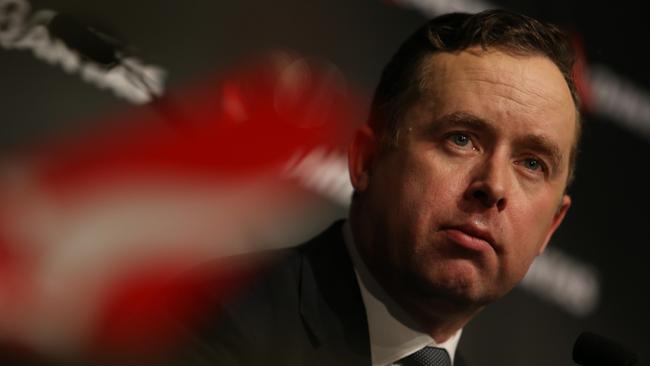Qantas CEO Alan Joyce’s comments may lead to law preventing airline ‘price signalling’
COMMENTS by Qantas chief Alan Joyce have prompted a call to ban airline statements that lead to industry-wide fare hikes.

Travel
Don't miss out on the headlines from Travel. Followed categories will be added to My News.
A LAW that bans bank bosses from telegraphing rate rises to each other could be extended to airline CEOs to stop statements that lead to industry-wide fare hikes.
In response to recent comments by Qantas chief Alan Joyce, the federal minister responsible for consumer affairs and competition Bruce Billson told News Corp he wants to extend to the entire economy laws that stop banks from “price signalling”.
BIG BUCKS: Alan Joyce paid $2m as Qantas struggles
QANTAS V VIRGIN: The war that cost $8.75m a day
The law prohibits disclosing information — publicly or privately — for the purpose of “substantially lessening competition”. The information may relate to price, capacity or commercial strategy.
In a live broadcast announcing the Flying Kangaroo’s largest ever loss last week, Mr Joyce publicly revealed a medium-term freeze on “capacity growth” after several years of adding flights.
Sharemarket analysts now expect fare increases. “Capacity moderation and an emerging demand surplus will drive yield (profit) improvement,” said Macquarie Securities’ Sam Dobson.
And a leading competition lawyer, who asked to remain anonymous because of his firm’s work in the aviation sector, said: “I would tend to think that (Mr Joyce’s) statement could attract some attention if the price signalling laws were extended.”
NOT FARE: Flights soar as fuel drops
“This could qualify” as a breach, said Stephen Voss, a partner at Adelaide law firm Thomson Geer and specialist in competition and consumer law.
The unnamed lawyer said the remarks were more concerning than comments early this year by Mr Joyce and a Virgin investor which drew the ire of Australian Competition and Consumer Commission chairman Rod Sims.
At the time Mr Sims reacted by saying “recent statements regarding airline capacity shows why (price-signalling) laws need to be extended to all sectors of the economy”. With only two players in the aviation market it was not healthy to have that sort of public signalling, because a “cosy duopoly” can lead to reduced competition and higher prices for consumers, Mr Sims added.
The ACCC declined to comment on Mr Joyce’s latest remarks but did highlight its recent submission to the official review of competition policy, in which it forcefully argued for the expansion of price-signalling prohibitions.
“Anti-competitive disclosures can be just as harmful as hard-core cartels,” the ACCC said.
Mr Billson told News Corp his “instinct” was to widen the prohibitions.
Mr Billson said he had “form on all of this”, having introduced a private member’s bill in 2010 while still in Opposition. It was voted down by the then Labor Government.
The bill defined signalling as communicating “price-related information” to a competitor “for the purpose of inducing the competitor to vary its price, with the effect or likely effect of substantially lessening competition”. That communication could include “broadcasts without a particular defined audience and public announcements”.
Mr Billson said he had made his view on price signalling known to Professor Ian Harper, the economist who is leading the competition policy review.
Mr Joyce made his comments on Thursday. On Friday chief rival and Virgin Australia CEO John Borghetti said some fares would probably jump.
Originally published as Qantas CEO Alan Joyce’s comments may lead to law preventing airline ‘price signalling’


